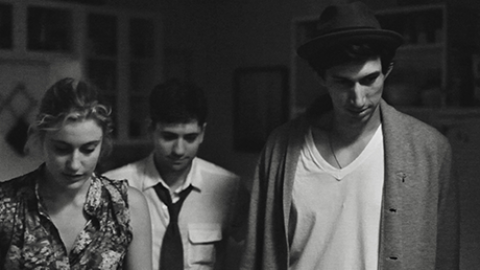Deep Focus: Mistress America
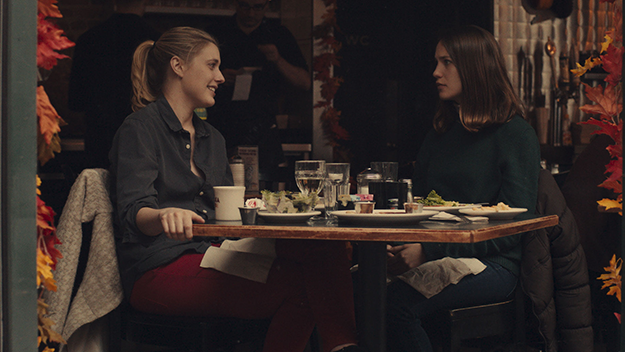
The narrator of Truman Capote’s Breakfast at Tiffany’s, a key influence on Noah Baumbach’s blissful mad comedy Mistress America, muses that Holly Golightly is “a lopsided romantic.” Where a realist would study a menu “for its nutritional value,” Holly would be “gluttonous for everything on it.”
The same goes for Brooke Cardinas, the muse, heroine, and crackpot in the script Baumbach has written with the woman who plays Brooke, Greta Gerwig. Another charismatic eccentric from the provinces—well, New Jersey—she glides through multiple milieus in New York City with borderline-gawky grace, but she must also paddle like crazy just to stay alive.
She calls herself an autodidact: “That word is one of the things I self-taught myself.” She teaches a spinning class, tutors junior-high school algebra, and dabbles in interior design. She envisions creating a comic-book heroine called “Mistress America,” a government worker by day and super-heroine by night.
All the while she plots to open a homey bistro called “Mom’s,” which would triple as a cozy boutique and hangout and hip community center. Brooke talks and moves so quickly, you barely have time to register that the restaurant’s name pays tribute to her late mother. Her widower father is about to marry an attractive divorcee (Kathryn Erbe) whose daughter, Tracy Fishco (Lola Kirke), has begun her first year at Barnard.
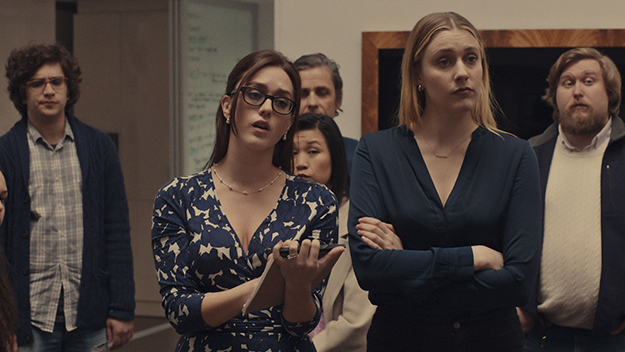
Tracy may be untested and even unformed compared to Brooke, but she’s deceptively canny. She’s more of a survivor—she can get what she thinks she wants. If you respond to the movie at all, you end up loving them both.
Starting with its swift, merciless satire of contemporary college life, the film is acutely funny about the roles people play as they forge their adulthood or dodder through it. Tracy’s roommate is world-weary before she steps out of the dormitory; she can’t believe Tracy would do anything so square as attend her class’s convocation. In a seminar about the Renaissance, one self-confident Barnard gal rhapsodizes about velvet, jewels, and brocades, until the teaching fellow says she was hoping to hear something about literature. Tracy tells a seasoned dean of students that she can’t shake procrastination, no matter how hard she tries. The older woman replies, with solemn authority: “Try harder.”
Experiencing instant alienation from academia, Tracy reaches out to Brooke as her soon-to-be sort-of stepsister. Her mom has told her that Brooke is supposed to be “fun.” For Tracy it’s more like instant ecstasy. The teeter-totter balance between Tracy and Brooke moves Mistress America beyond clever updates of Breakfast at Tiffany’s. (Baumbach and Gerwig have also floated comparisons to The Great Gatsby and John Hughes’s oeuvre.) Tracy is an aspiring writer who loves Brooke the way Capote’s narrator did Holly. But she also illustrates what he wrote about the mutability of most characters: “The average personality reshapes frequently, every few years even our bodies undergo a complete overhaul—desirable or not, it is a natural thing that we should change.” Tracy is the best example in the movie of all those people who undergo “complete overhaul.” Brooke and Holly will “never change because they’d been given their character too soon; which, like sudden riches, leads to a lack of proportion.” Hence the “lopsided romantic.”
Tracy makes Brooke feel smart. Brooke makes Tracy feel alive. Brooke can seem ephemeral or fake, partly because she resists winnowing down life’s possibilities. (Holly Golightly, too, risked being called a “phony.”) But she’s also the most vivid, intriguing, and outward-directed narcissist in a movie filled with self-absorbed people. Tracy can seem idolatrous or amorphous. But she’s also ruthlessly objective—she knows that Brooke, who’s nearing 30, can no longer coast on her multiple charms. She blithely exploits her new friend as the basis of a short story aimed to win her a spot in the campus literary society, a noxious club full of Brie-eaters and briefcase-carriers.
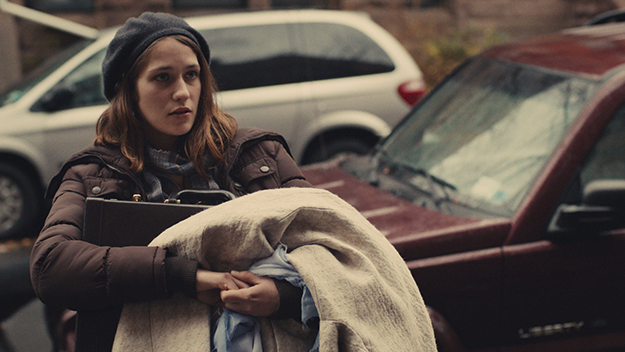
Tracy’s clandestine fictionalizing of Brooke’s life (which doubles as the film’s narration) and Brooke’s desperate pursuit of funding for her restaurant provide the movie with a twin comic engine. Everything comes together in an existential pile-on at the posh Connecticut home of Brooke’s one-time boyfriend Dylan (Michael Chernus) and his wife Mamie Claire (Heather Lind), who years ago, Brooke says, stole everything from her, including her two cats.
What fuels the movie’s engine is the mercurial chemistry between its characters. Mistress America is as precisely staged and written as prime Thirties screwball comedy, but it’s as emotionally risky as an Altman film like M*A*S*H. Even when characters declare who they are, their identities are subject to change. Tracy connects with one simpatico freshman, Tony (Matthew Shear), when he saves her from being caught sleeping through a banal discussion of Antigone. He, too, aspires to join the college literary society. Their alliance is sweet—he’s eager to read her short stories, swap “notes,” and mix some screwdrivers, apparently his signature drink. She thinks he may be her guy. But a few scenes later he abruptly and emphatically declares that he couldn’t have her as a girlfriend because he’d feel as if he were struggling to keep up with her. His chosen lover, Nicolette (Jasmine Cephas-Jones), is defined by her possessiveness. She’s jealous of Tracy and obsessed with the prospect that Tony might commit “adultery.” That spurs Brooke on to one of her characteristic declarations: “You’re all 18! Where is this old-person morality coming from? There’s no cheating when you’re 18—you should all be touching each other all the time.”
As a performer, Gerwig is an original; she can play the swan, the ugly duckling, and sometimes both at once. The heroine of Gerwig and Baumbach’s previous collaboration, Frances Ha (13), became a modern dance choreographer. Brooke turns the comings and goings of a gal about town into an unpredictable essay on the joy of motion. When Brooke enters the film down the tall red staircase behind Time Square’s half-price ticket booth, it’s a triumph of impudence. She doesn’t swing down the steps as she would in a Busby Berkeley movie: she takes each stair solidly and exuberantly. When she sings on stage with a favorite band at a club, her long arms make big, hypnotizing movements, but when she dances with Tracy on the club floor, she’s just an older cool kid rocking out.
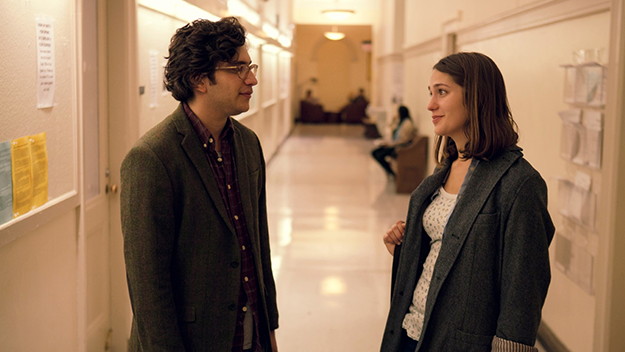
Brooke’s patter merely appears to be built on non sequiturs. It’s actually comprised of delayed sequiturs. She takes in everything and responds eventually, as Tracy discovers when she’s anointed “spiritual advisor” to Mom’s, the restaurant. (Tracy will be expected to wait tables there.) As Brooke tells the still-besmitten Dylan, she knows herself—that’s why she could never go into therapy.
At times, Brooke can be shockingly blunt—she wonders to Tracy’s face whether the girl is “a Zen master or a sociopath. ” The co-writers concoct odd, curlicue sentences whose comic effect depends on Gerwig’s genius for teasing Tracy’s and the audience’s interest in Brooke’s many talents. She starts one riff about interior design by asking: “Do you know the Bowery Hotel? Well, if you walk down about a block south there is a laser-hair removal center that is very hip, and I did the waiting room.” Gerwig aces every beat.
She wouldn’t be able to do this without Kirke. In her first lead role (she played an extremely bad girl in Gone Girl), Kirke exudes a sympathetic aura that Gerwig can bounce off like a trampoline. But Kirke also keeps the audience off-kilter with undercurrents of shrewdness, ambition, equivocation, and redemptive decency.
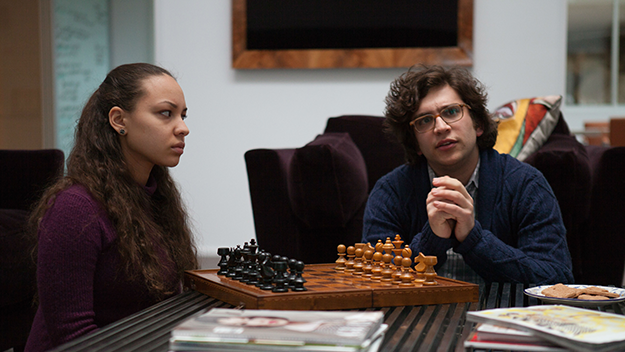
This balance is part of Baumbach’s deftness as a comedy director. He prods gifted actors to hit a dominant emotion hard without obliterating the other feelings that come to the fore in future scenes. His movie never cheats you and his characters always surprise; his ensemble earns laughs boldly and subtly. Shear’s Tony, for example, is immediately winning, in neurotic ways. But he’s more engaging as he’s able to reveal what formed those knots. (He owns a car but he’s no rich kid; his mechanic father and uncle run a body shop.) Tony keeps close to center-screen even in the crowded farce climax. When we learn that Brooke’s ex-friend Marie Claire really did steal, among other things, her cats, we also see Tony attracting pregnant women like catnip.
Baumbach’s film-craft is as nimble as his word-craft. He adopts a new style every time out. In Frances Ha he hit on a contemporary equivalent of the French New Wave at its most lyrical. In While We’re Young (released a few months ago; now on Blu-ray/DVD) he heightened observational humor into depth-charged comedy-drama or satire-drama, in the manner of Paul Mazursky (Bob & Carol & Ted & Alice, Blume in Love) or Barry Levinson (Diner, What Just Happened). In Mistress America, applying the tightness and precision of screwball comedy to a contemporary existential mess pushes him to create a meticulous yet robust mosaic. Space seems to expand and contract as easily as an accordion. Baumbach nails the comic center of each scene, no matter how contained or expansive. It could be the still-life/sight-gag of a cafeteria tray containing Cheerios and pizza. It could be Brooke stranded on the stage before a picture window in Dylan’s swank media room, all the glories of Greenwich, Connecticut spread out behind her, and an uncertain future ahead of her.
With Tracy and her friends, Baumbach goes beyond identity crisis to identity chaos. With Brooke, he mines a New World paradox: because she’ll never change, she’ll always be a paragon of fresh possibilities. In her inexhaustible promise and inevitable disappointments, she lives up to her alter ego. She truly is an American mistress.



